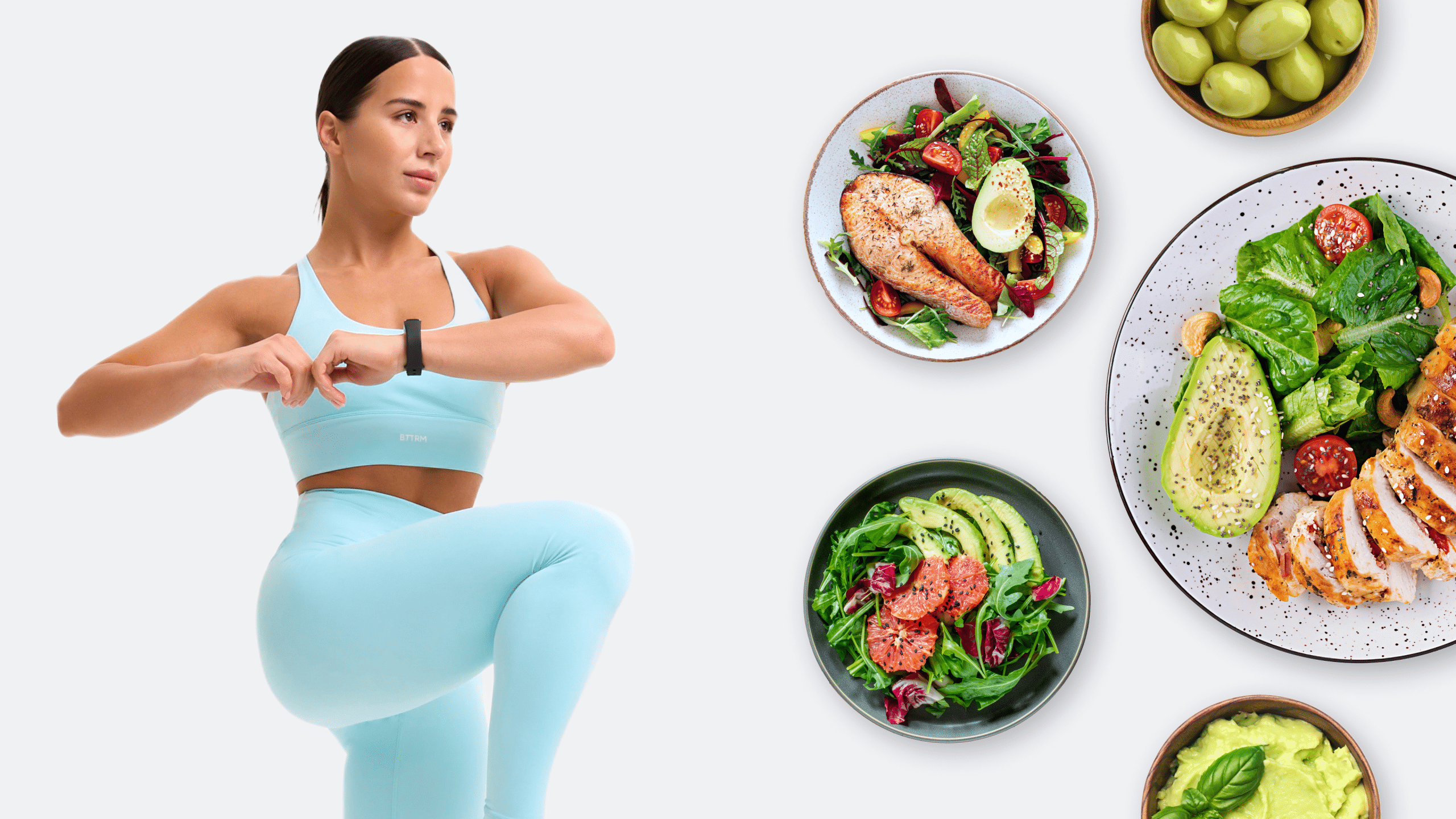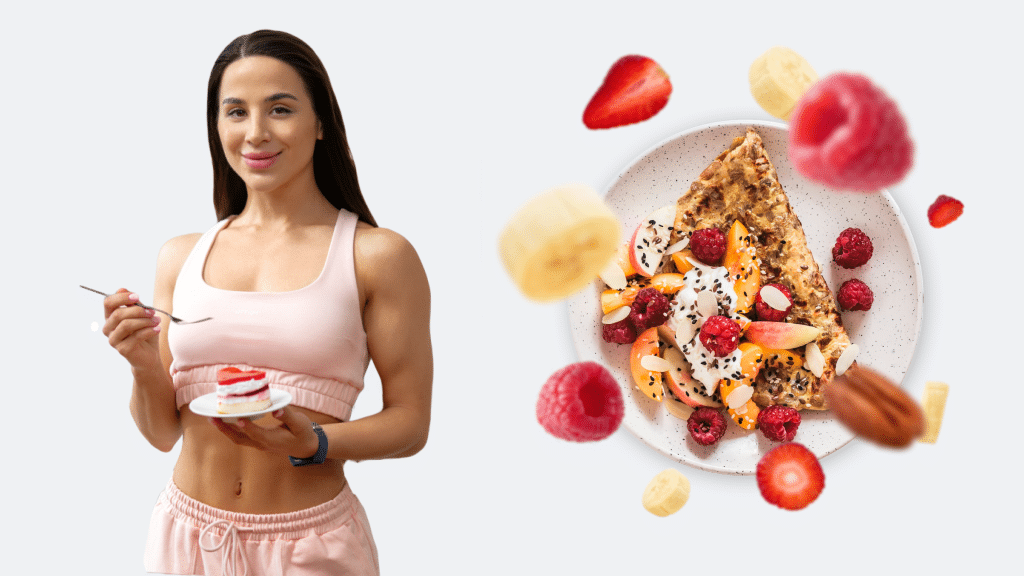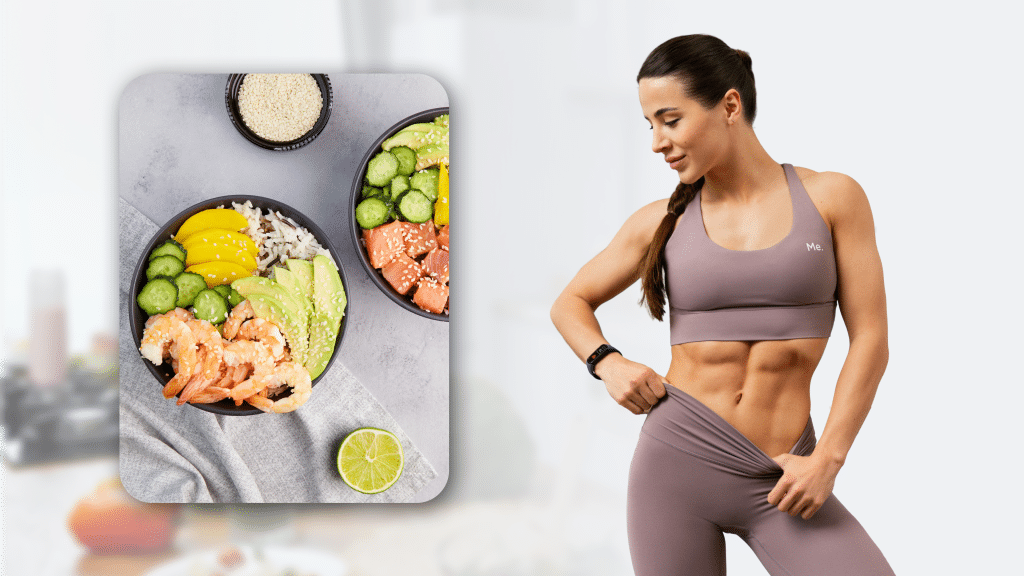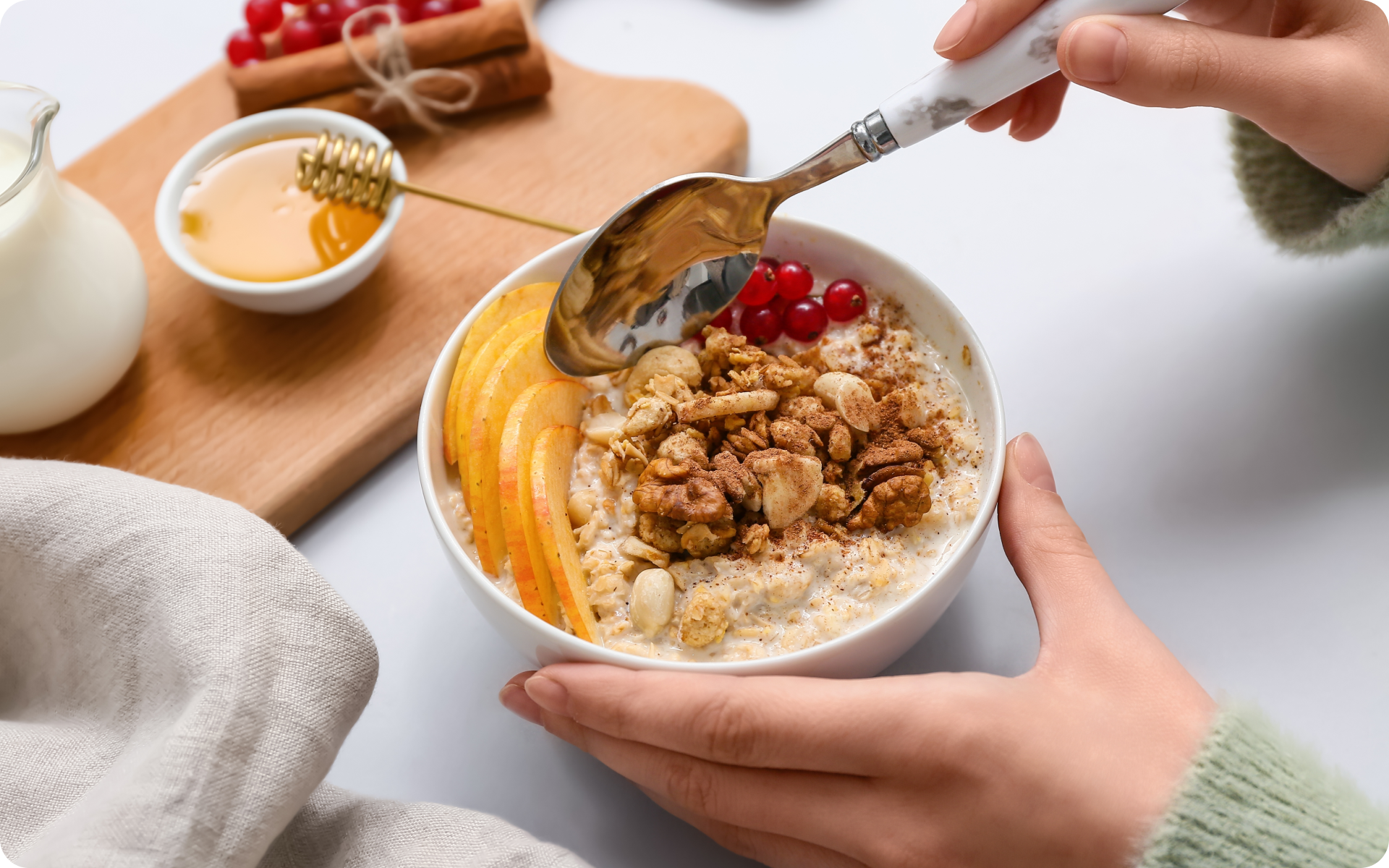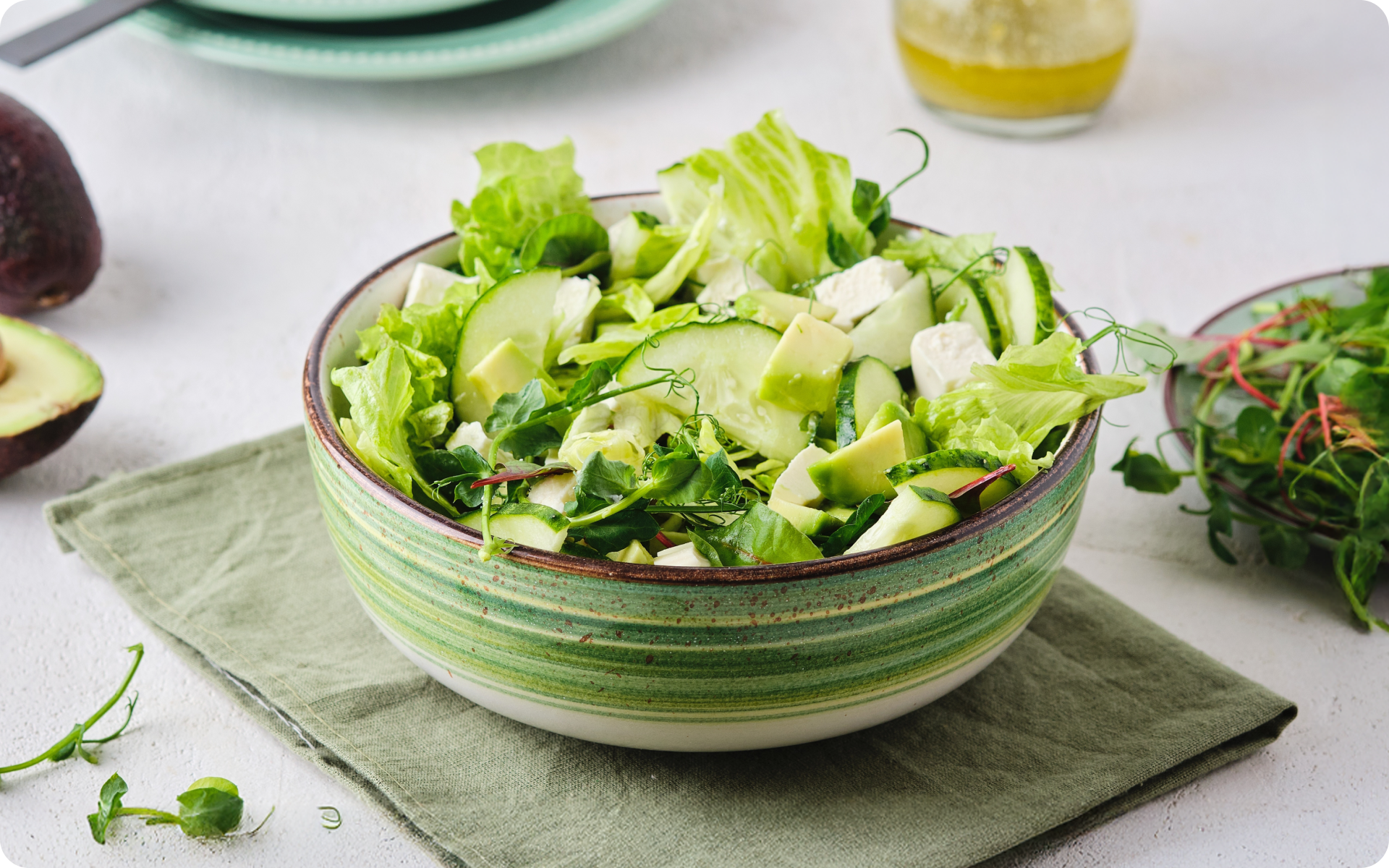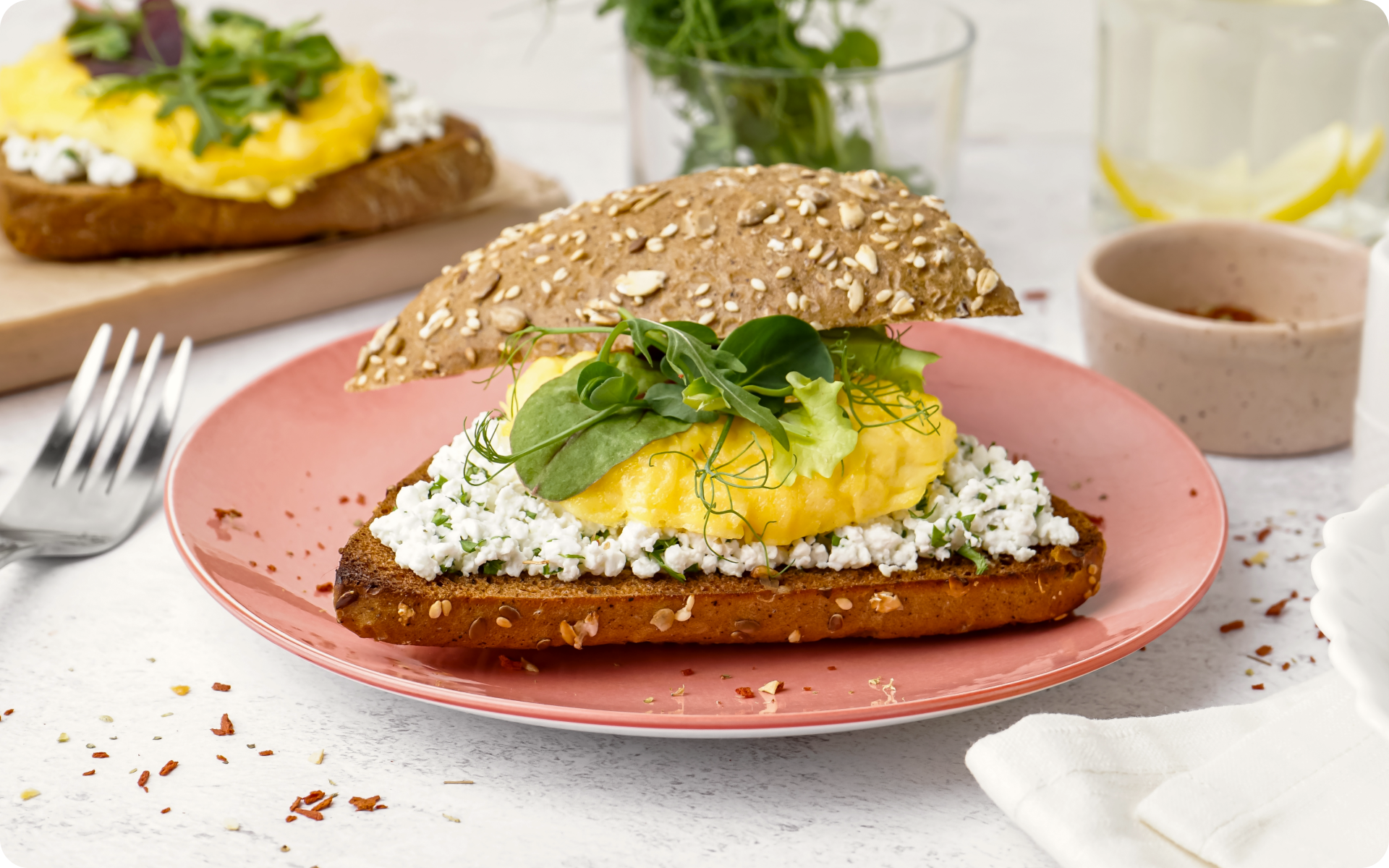Whether recreational or competitive, bodybuilding is a lifestyle, as it involves the time you spend in and out of the gym. The reason for this is simple – when you’re attempting to build muscle mass, what you eat is just as important as working out in the gym.
Using a 7-day meal plan for muscle gain can become frustrating if you don’t understand the science behind building muscles. In addition to the basics of bodybuilding, calorie, and macro needs, this article explains what to eat and what to avoid on a bodybuilding diet and provides a one-week sample menu.
7-Day Meal Plan for Muscle Gain: How Does Your Body Build Muscle?
The process of muscle gain and fat loss happens primarily as a result of an energy imbalance i.e. the calorie equation (1).
Running on a treadmill for an hour each day won’t necessarily make you gain muscle mass. Neither will lifting weights alone. The real secret behind building muscle mass is a calorie surplus. A well-balanced diet combined with an efficient exercise regimen is essential for gaining lean muscle mass (2).
High-intensity training and intense weight lifting can provide dramatic results in muscle gain. However, without the right diet, it may not result in the body you want. In fact, without a balanced diet and sufficient calories, your difficult workouts may be wasted and you’ll gain no muscle at all.
How Many Calories Do You Need to Build Muscle?
A 7-day meal plan for weight loss and muscle gain typically consists of two phases, the bulking and cutting phases:
Bulking Phase
This phase aims for muscle gain and fat loss simultaneously. It lasts anywhere from a few months to years, depending on several factors such as experience level, time to reach your desired goal, body weight, and age (3).
During your bulking phase, it’s recommended that you increase your calorie intake by 15% (4). For example, if your maintenance calories are 2,500 per day, you should eat 2,875 calories per day (2,500 x 0.15 = 375) during your bulking phase.
Cutting Phase
After the bulking cycle is completed, it often becomes necessary to burn off the excess fat. The cutting phase is much shorter than the bulking phase and lasts anywhere from a few weeks to 6 months.
During your cutting phase, it’s recommended that you decrease your calorie intake by 15% (4). For example, if your maintenance calories are 2,500 per day, you should eat 2,125 calories per day (2,500 x 0.15 = 375) during your cutting phase.
What’s the Ideal Macro Ratio for Gaining Muscle?
Although your calorie intake will vary at different phases of the muscle-building cycle, your macro ratio is likely to stay constant. To gain muscle, it’s recommended that you get something like (5):
- 30–35% of your calories from protein
- 55–60% of your calories from carbs
- 15–20% of your calories from fat
What to Eat on the Bodybuilding Diet
Eating the right foods in the recommended amounts will supply your muscles with sufficient nutrients to recover from intense workouts and grow bigger. Some of the foods that should feature in your 7-day meal plan for lean muscle gain include:
Carbohydrates
Carbs are the main source of energy for your body. They are essential for powering you through high-intensity workouts and keeping you going throughout the day (6).
Consume starchy carbohydrates such as rice, pasta, and bread to provide you with an adequate amount of energy to train at a high intensity. Whole grain versions provide more fiber, which can help this energy last longer. Also, opt for starchy vegetables such as potatoes, corn, and cassava.
Protein
This is the main nutrient that supports long-term muscle growth (7). It’s also satiating enough to power you through the day without the need to snack on unhealthy foods (8).
Eat lean proteins such as lean beef, skinless chicken, fish, and turkey every day to ensure your recovery from tough workouts.
Read More: Protein Powder 101: Everything You Need to Know About This Popular Supplement
Vegetables
All vegetables are rich in nutrients and fiber that support digestion, metabolism, and muscle growth. Green leafy vegetables such as spinach, kale, watercress, and broccoli contain high amounts of iron, vitamin A, and folate, which help you recover from intense training. Vegetables also contain antioxidants, which prevent muscle damage and help with muscle recovery (9).
Fiber
One of the most important nutrients for good digestion and fueling efficient workouts is fiber. Fiber slows down digestion, providing your body with longer-lasting energy, and can keep you feeling fuller for longer so you don’t feel like snacking when you’re not on a training session (10). High-fiber foods include brown rice, whole-wheat bread, oats and beans, and legumes.
Healthy Fats
Healthy fats are essential for a balanced diet. They supply your body with energy, keep you full for longer, and support heart health (11). Healthy fats include avocado, extra virgin olive oil, other vegetable oils, fatty fish, nuts such as almonds and walnuts, and seeds such as sunflower seeds.
Muscle-Building Supplements
Taking supplements can be helpful if you’re following a training regimen to help maximize your muscle-building efforts. Supplements contain vitamins, minerals, and amino acids that keep you healthy when training hard and may increase the rate at which you gain muscle mass.
Some of the most popular bodybuilding supplements include:
- Whey protein – an easy and convenient way to increase your protein intake (12).
- Creatine – provides your muscles with the necessary energy to perform an additional rep or two (13).
- Caffeine – decreases fatigue and allows you to work harder (14).
For example, you may take a pre-workout supplement before every workout such as whey protein mixed with creatine and essential amino acids to fuel effective workouts; during your workout, you may take a BCAA supplement to prevent muscle damage; and you may take a protein shake with essential amino acids, creatine, and glutamine after every workout (15).
Make sure to use the right amount of supplements recommended by your trainer to achieve effective results without any adverse side effects. Always discuss any supplements with your healthcare provider, particularly if you have any medical conditions or are taking any medications.
7-Day Meal Plan for Muscle Gain: What to Avoid on the Bodybuilding Diet
Consuming the wrong foods or not having enough of the right ones can frustrate your bodybuilding efforts. Here are some foods you should limit or avoid altogether:
Alcohol
Consuming alcohol can increase the rate at which you gain fat, which will make it more difficult for you to build muscle mass. While pure alcohol can help temporarily improve your mood and give you more energy, it’s not a good idea to drink alcohol when you’re trying to put on lean mass (16).
Deep Fried Foods
Fried foods are full of unhealthy fats, which can have adverse effects on your body (17). Fried foods don’t provide your body with all the nutrients it needs to build muscle and the excess amount of fat in them will make it more difficult for you to lose weight when cutting.
Added Sugars
Avoid adding sugar to your food as much as possible. Foods that contain added sugars are high in calories and often also high in unhealthy fat, which can promote the gaining of fat mass (18).
Consume more foods that are rich in protein such as skinless chicken, fish, and turkey to help prevent muscle breakdown when following the bodybuilding diet.
Sample 7-Day Meal Plan for Muscle Gain
Here’s a sample one-week bodybuilding menu.
Each day has approximately 2,500 calories worth of nutritious foods. When you’re bulking, you’ll increase how much food you eat and when you’re cutting, you’ll reduce it. You can enjoy the foods in this menu during either phase, just make sure to adjust your portions accordingly.
Day One
- Breakfast: 2 bowls of cornflakes and 2 servings of whole-wheat toast (585 calories)
- Lunch: 2 servings of quick buffalo chicken salad on whole-wheat bread with 1 ounce of almonds (620 calories)
- Snack: 1 cup of granola and 1 serving of yogurt and strawberries (287 calories)
- Supper: 2 BBQ chicken sandwiches and 1 serving of easy hard-boiled eggs (1,011 calories)
Total daily calories: 2,503
Day Two
- Breakfast: 4 banana egg pancakes and 1 apple (591 calories)
- Lunch: 2 turkey sandwiches and 2 cups of basic protein shake (603 calories)
- Snack: 1 apple with almond butter (291 calories)
- Supper: 2 BBQ chicken sandwiches (940 calories)
Total daily calories: 2,425
Day Three
- Breakfast: 2 egg and cheese breakfast sandwiches (617 calories)
- Lunch: 2 peach protein smoothies (690 calories)
- Snack: 1 apple with almond butter and 1 serving of cucumber slices (307 calories)
- Supper: 2 servings of Mongolian beef with rice (940 calories)
Total daily calories: 2,544
7-Day Meal Plan for Muscle Gain: Day Four
- Breakfast: 2 servings of blueberry protein pudding and 2 slices of buttered toast (675 calories)
- Lunch: 2 simple caprese sandwiches (707 calories)
- Snack: 1 bowl of cornflakes and 1 apple (317 calories)
- Supper: 2 servings of fried eggs and ham sandwich (940 calories)
Total daily calories: 2,515
Read More: Intermittent Fasting and Muscle Gain: Here’s What You Need to Know
Day Five
- Breakfast: 2 servings of cottage cheese breakfast with whole-wheat toast (752 calories)
- Lunch: 2 cups of basic protein shakes and 1 cup of grapes (588 calories)
- Snack: 1 bowl of cornflakes and 1 serving of cheese slices (337 calories)
- Supper: 2 servings of easy grilled chicken teriyaki with rice and 2 servings of easy steamed green beans (807 calories)
Total daily calories: 2,485
Day Six
- Breakfast: 1 serving of butter and honey oatmeal (709 calories)
- Lunch: 2 peach protein smoothies (690 calories)
- Snack: 2 servings of pineapple kale smoothies (307 calories)
- Supper: 2 servings of balsamic chicken salad with whole-wheat pasta (870 calories)
Total daily calories: 2,575
7-Day Meal Plan for Muscle Gain: Day Seven
- Breakfast: 2 servings of peanut butter protein oats (780 calories)
- Lunch: 2 cups of grapes and 2 servings of banana protein smoothie (686 calories)
- Snack: 2 cups of nonfat Greek yogurt with granola (283 calories)
- Supper: 2 BLT sandwiches (687 calories)
Total daily calories: 2,436
Tips for Building Muscle
There’s plenty that can be said about the right diet for muscle gains. However, your success ultimately comes down to doing these two things:
Keep Your Diet Lean
There’s no way around the bodybuilder diet – you have to implement it fully, down to the macro ratios and calorie recommendations. These principles will help you keep your diet lean:
Eat at Least 1 Gram of Protein per Pound of Body Weight
Protein is an extremely important component of your diet if you’re looking to gain muscle (19). Many bodybuilder diets recommend an intake of at least 1 gram of protein per pound of your weight. The reason for this is simple – your body needs protein to build muscle.
Consume Carbs Moderately when Cutting
Carbohydrates are an essential source of energy for intense training (20) and during a bulking phase, you’ll need to eat more carbs than you would when trying to cut or lose weight. Many people who are trying to lose weight find success with low-carb diets. However, carbs remain important, so they shouldn’t be completely removed from your diet, even when cutting.
Use a Carb-Timing Method if You Can’t Stay on Point with Low-Carb
When you’re cutting or trying to lose weight but still want to work out, you can use a carb-timing method if you struggle with getting the right amount of protein and the right ratio of fats and carbs without falling into the trap of feeling incredibly hungry or deprived.
A carb-timing method (or cyclic ketogenic diet) is a 4-6 week plan that is based around eating low carbs during the first 2 days of the week, and high carbs on the remaining 3 days. You’ll time your high-carb days to be on high-intensity workout days so the energy gets used up rather than stored.
Drink a Gallon of Water per Day
Forget low-calorie sweetened drinks and stick with plain old water. Drinking a gallon of water per day is essential when you’re looking to build muscle in any way. You should eat a lot of fruits and vegetables as they’re a good source of water. Use natural flavors if you don’t like the taste of plain water. You can flavor it with a slice of lemon or your preferred choice of frozen fruits.
Stay on Track
Having a working 7-day meal plan for muscle gain is only half the battle. Sticking to it can be challenging. To help you stay on track:
Have a Weekly Cheat Meal
Have a meal that’s higher in calories and/or fats once a week, but don’t do it more often than this. It will help you feel less deprived and more satisfied with the diet as a whole, while still benefiting from the muscle-building effects.
Take Progress Photos
Are you feeling unmotivated? Take progress photos to see your results. Take them under similar lighting conditions (preferably natural light). Take photos of yourself from different angles – front, profile, left side, right side. Compare how your body is changing.
Take Protein Drinks and Bars to Curb Cravings
Keep some bars or protein drinks in your bag at all times. When you’re feeling hungry mid-day, grab one of them and enjoy a small snack to curb your cravings. Doing this will keep you from getting too hungry so that when you do eat your next meal, you can eat more protein.
FAQs
Which food is best for muscle gain?
Whole, nutrient-dense foods are the best choice for building muscle. This means choosing whole grains, lean proteins, healthy fats, and plenty of fruits and vegetables.
Protein
Protein is essential for building and maintaining muscle. Aim to consume 1 gram of protein per pound of body weight each day (7). Good sources of protein include chicken, turkey, fish, tofu, eggs, and dairy products.
Carbohydrates
Carbohydrates provide the fuel your muscles need to perform during workouts (20). Opt for complex carbohydrates such as whole grains, sweet potatoes, brown rice, quinoa, and fruits instead of simple carbohydrates such as sugary snacks and ultra-processed foods.
Healthy Fats
Incorporating healthy fats into your diet is important for muscle gain. Healthy fats help with hormone production, cardiovascular health, and energy levels (21). Choose sources such as avocados, nuts, seeds, olive oil, and fatty fish such as salmon.
Fruits and Vegetables
Fruits and vegetables are packed with vitamins, minerals, and antioxidants that support muscle growth and repair. Aim to include a variety of colorful fruits and vegetables in your meals to ensure you get a wide range of essential nutrients.
Hydration
Proper hydration is essential for muscle growth. Water helps transport nutrients to your muscles and helps with the removal of waste products (22). Aim to drink at least half your body weight in ounces of water each day, and more if you’re physically active or live in a hot climate.
Supplements
While it’s best to get most of your nutrients from whole foods, supplements can be a helpful addition to your diet for muscle gain (23). Creatine, protein powders, and branched-chain amino acids (BCAAs) are commonly used by athletes and bodybuilders to support muscle growth.
What should you drink to gain muscle?
To gain muscle, drink the following beverages that can support muscle growth:
- Chocolate Milk: Chocolate milk contains a good balance of carbohydrates and protein, which makes it an ideal post-workout recovery drink. The protein helps repair muscles, while the carbs replenish glycogen stores (24).
- Green Tea: Green tea is rich in antioxidants called catechins, which may help with fat loss and improve exercise performance. It also provides a mild caffeine boost for energy (25).
- Whey Protein Shake: Whey protein shakes are a convenient way to increase protein intake, which is essential for muscle repair and growth (12). They are quickly absorbed by the body, which makes them ideal post-exercise.
- Beetroot Juice: Beetroot juice is high in nitrates, which can relax blood vessels to enhance blood flow. This improved circulation may help deliver more nutrients to muscles during workouts (26).
- Tart Cherry Juice: Tart cherry juice has been shown to improve sleep quality in athletes, which is essential for recovery (27).
- Bone Broth: Bone broth is an excellent source of collagen, amino acids, and minerals that support joint health and muscle recovery (28). It can be a comforting and nutritious addition to a muscle-building diet.
- Banana Smoothie: Bananas are rich in potassium, which helps prevent muscle cramps and supports proper muscle function (29). A banana smoothie with added protein sources can be a satisfying post-workout snack.
- Water: Staying hydrated is essential for optimal muscle function and recovery. Water supports nutrient transport, temperature regulation, and overall performance during workouts (30).
These beverages offer a diverse range of nutrients that can help with muscle-building, recovery, and overall performance when combined with a balanced diet and regular exercise routine.
What is the best eating schedule to gain muscle?
The eating schedule that allows you to consume enough nutrients to support muscle growth and recovery while balancing your daily activities is the best one for gaining muscle. This may vary depending on your individual needs, but a general guideline could be:
- Breakfast: Consume a high-protein meal within an hour of waking up to jumpstart muscle repair and growth.
- Pre-workout: Eat a small snack containing carbohydrates and protein 1-2 hours before you exercise to fuel your workout.
- Post-workout: Within 30 minutes of completing your workout, eat a meal or snack that includes protein and complex carbohydrates to replenish glycogen stores and help with muscle repair.
- Mid-morning and Mid-afternoon: Eat a small snack or meal that includes protein, healthy fats, and complex carbohydrates to support energy levels and muscle recovery between meals.
- Lunch: Eat a well-balanced meal with lean proteins, complex carbohydrates, healthy fats, and plenty of fruits and vegetables.
- Dinner: Similar to lunch, you should aim for a balanced meal that includes all the food groups. This is also a good time to incorporate any supplements you may be taking.
- Bedtime Snack: Consuming a protein-rich snack before bedtime can help prevent muscle breakdown overnight and help with muscle repair.
Remember that everyone’s eating schedule will look different and that it’s important to listen to your body and adjust as needed.
How can I build muscle in 7 days?
7 days is hardly enough time to see significant muscle growth, but you can still make some progress by following these tips:
- Focus on Compound Lifts: Compound exercises such as squats, deadlifts, and bench presses target multiple muscle groups at once and are a more efficient way to build muscle(31).
- Increase Training Volume: Increase the number of sets and reps you perform for each exercise to increase training volume and stimulate muscle growth (32).
- Progressive Overload: Continuously challenge your muscles by gradually increasing the weight or intensity of your workouts throughout the week (33).
- Eat Enough Protein: Aim for at least 1 gram of protein per pound of body weight to support muscle growth and repair.
- Stay Hydrated: Proper hydration is essential for optimal muscle function during exercise (30).
- Get Enough Rest: Adequate rest and sleep are essential for muscle recovery and growth. Aim for at least 7-9 hours of sleep each night (34).
- Focus on Form: Make sure you’re performing exercises with proper form to target the intended muscle groups and prevent injuries.
The Bottom Line
A 7-day meal plan for muscle gain is great, but it’s equally important to understand the basics of muscle-building. Once you do, you’ll keep your diet balanced and stay consistent. Your efforts will be rewarded with muscle gains and a sculpted body.
DISCLAIMER:
This article is intended for general informational purposes only and does not serve to address individual circumstances. It is not a substitute for professional advice or help and should not be relied on for making any kind of decision-making. Any action taken as a direct or indirect result of the information in this article is entirely at your own risk and is your sole responsibility.
BetterMe, its content staff, and its medical advisors accept no responsibility for inaccuracies, errors, misstatements, inconsistencies, or omissions and specifically disclaim any liability, loss or risk, personal, professional or otherwise, which may be incurred as a consequence, directly or indirectly, of the use and/or application of any content.
You should always seek the advice of your physician or other qualified health provider with any questions you may have regarding a medical condition or your specific situation. Never disregard professional medical advice or delay seeking it because of BetterMe content. If you suspect or think you may have a medical emergency, call your doctor.
SOURCES:
- Energy balance and its components: implications for body weight regulation (2012, ncbi.nlm.nih.gov)
- Improving muscle mass: response of muscle metabolism to exercise, nutrition and anabolic agents (2008, pubmed.ncbi.nlm.nih.gov)
- Physiological implications of preparing for a natural male bodybuilding competition (2018, ncbi.nlm.nih.gov)
- Nutrition, Pharmacological and Training Strategies Adopted by Six Bodybuilders: Case Report and Critical Review (2017, ncbi.nlm.nih.gov)
- Macronutrient considerations for the sport of bodybuilding (2004, pubmed.ncbi.nlm.nih.gov)
- Physiology, Carbohydrates (2023, ncbi.nlm.nih.gov)
- Dietary Protein and Muscle Mass: Translating Science to Application and Health Benefit (2019, ncbi.nlm.nih.gov)
- Protein, weight management, and satiety (2008, sciencedirect.com)
- Health Benefit of Fruits and Vegetables (2012, nih.gov)
- Health benefits of dietary fiber (2009, academic.oup.com)
- A healthy approach to dietary fats: understanding the science and taking action to reduce consumer confusion (2017, nih.gov)
- Whey Protein Supplementation Enhances Whole Body Protein Metabolism and Performance Recovery after Resistance Exercise: A Double-Blind Crossover Study (2017, ncbi.nlm.nih.gov)
- International Society of Sports Nutrition position stand: creatine supplementation and exercise (2007, ncbi.nlm.nih.gov)
- International society of sports nutrition position stand: caffeine and exercise performance (2021, ncbi.nlm.nih.gov)
- The effects of pre versus post workout supplementation of creatine monohydrate on body composition and strength (2013, biomedcentral.com)
- The Effects of Alcohol on Muscle Gains (2015, acefitness.org)
- Review on deep-fat fried foods: physical and chemical attributes, and consequences of high consumption (2024, link.springer.com)
- The Dose Makes the Poison: Sugar and Obesity in the United States – a Review (2020, ncbi.nlm.nih.gov)
- PROTEIN INTAKE FOR OPTIMAL MUSCLE MAINTENANCE (n.d., acsm.org)
- High-Quality Carbohydrates and Physical Performance (2018, ncbi.nlm.nih.gov)
- Dietary Fat and Sports Nutrition: A Primer (2004, ncbi.nlm.nih.gov)
- The Role of Water Homeostasis in Muscle Function and Frailty: A Review (2019, ncbi.nlm.nih.gov)
- The effects of protein supplements on muscle mass, strength, and aerobic and anaerobic power in healthy adults: a systematic review (2015, pubmed.ncbi.nlm.nih.gov)
- Chocolate milk: a post-exercise recovery beverage for endurance sports (2012, pubmed.ncbi.nlm.nih.gov)
- Green Tea Catechins and Sport Performance (2014, researchgate.net)
- Effects of Beetroot Juice Supplementation on Cardiorespiratory Endurance in Athletes. A Systematic Review (2016, ncbi.nlm.nih.gov)
- Effects of Short-Term Intake of Montmorency Tart Cherry Juice on Sleep Quality after Intermittent Exercise in Elite Female Field Hockey Players: A Randomized Controlled Trial (2022, ncbi.nlm.nih.gov)
- Health Benefits, Nutrients, & Side Effects (2023, webmd.com)
- Electrolytes (2023, ncbi.nlm.nih.gov)
- Hydration to Maximize Performance and Recovery: Knowledge, Attitudes, and Behaviors Among Collegiate Track and Field Throwers (2021, ncbi.nlm.nih.gov)
- Get Bigger, Faster, and Stronger with Compound Exercises (2022, issaonline.com)
- Maximizing Muscle Hypertrophy: A Systematic Review of Advanced Resistance Training Techniques and Methods (2019, ncbi.nlm.nih.gov)
- Progressive Overload Explained: Grow Muscle & Strength Today (n.d., blog.nasm.org)
- The Importance of Sleep and Recovery (n.d., blog.nasm.org)
